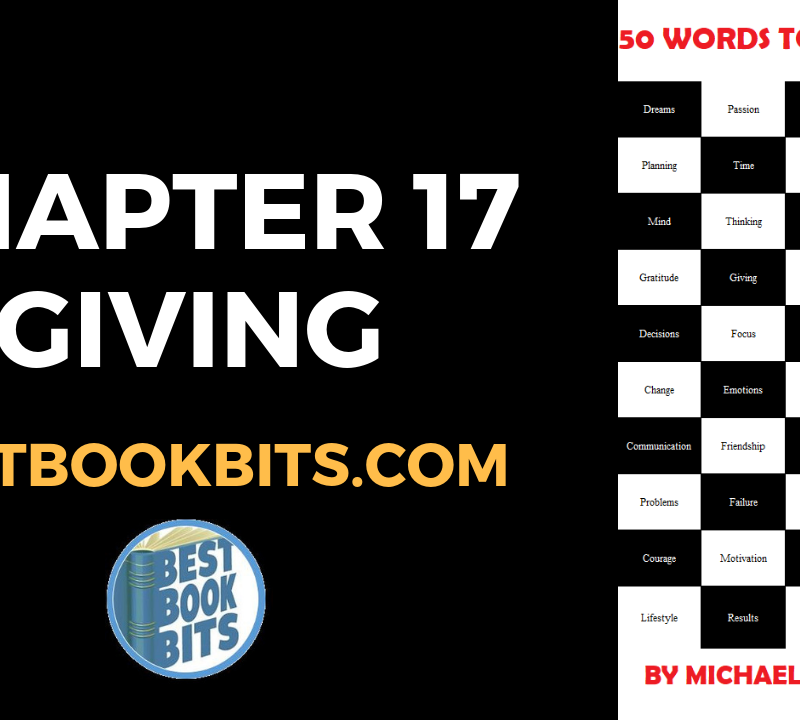★DOWNLOAD THIS FREE PDF SUMMARY HERE https://go.bestbookbits.com/freepdf
? MY FREE BOOK TO LIVING YOUR DREAM LIFE” https://go.bestbookbits.com/first-seven-steps
? SPONSOR BESTBOOKBITS BY USING PATREON https://www.patreon.com/bestbookbits
? SUPPORT BESTBOOKBITS BY CLICKING THE LINKS BELOW
- 150 PDF Summaries: https://go.bestbookbits.com/150
- Coaching Program: https://go.bestbookbits.com/coaching
- Subscribe to My Channel: https://www.youtube.com/bestbookbits?sub_confirmation=1
- Website: https://bestbookbits.com
- Instagram: https://www.instagram.com/bestbookbits
- Spotify: https://open.spotify.com/show/0q8OW3dNrLISzyRSEovTBy
- Facebook: https://www.facebook.com/michaelbestbookbits
- Book Club: https://bestbookbits.com/bookclub/
- Mailing List: https://mailchi.mp/d1dfc1907cdb/bestbookbits
An underrated key skill you need to develop on your path to realizing your dream, is the skill of effective communication. The ability to effectively impart and exchange information to another person is so vital in the age of communication. We communicate mostly to others by our physiology, body postures and facial expressions, then we use words to communicate the rest by tonality, speed and volume of our speech. This core skill of communication is one of the oldest skill’s we humans have been developing since the dawn of civilization and will continue to develop long into the future. The way you uniquely communicate to the world is a big part of what makes you, you. What you say communicates what you think. What you wear communicates your style. The look on your face communicates how you feel and what you do communicates to the world your intentions.
LEARN TO COMMUNICATE EFFECTIVELY
Some of us are better at speaking then writing, some prefer texting over talking and some prefer talking on the phone over face to face. We communicate daily with people from loved ones, family, friends, co-workers and strangers. Communication is a skill and any skill can be learned and improved with practice and repetition. The most highly paid people on the planet are the best communicators from entertainers like actors, musicians, comedians, to world leaders, CEO’s and sporting stars, who have crafted this highly paid skill of communication, and you can too. They have what people call ‘the gift of the gab.’ The ability to speak easily and confidently in a way that makes people want to listen and believe them. Studies have shown that those who can communicate effectively have a greater chance at having better relationships, career and success in life.
So start studying the great communicators of the world and practice with the people in your life. Practice talking to more people and also notice the other person’s communication style, are they aggressive, passive or assertive. Do think before they speak or do they speak off the cuff? Do they talk over other people or do they wait for the other person to finish before talking? By studying other people’s communication style you start to realize your own communication style, your own communication habits. From the sound of your voice, to the speed of pitch, to the thoughtfulness or thoughtlessness of your words. Your negative communication habits and your strong communication habits. Work on your weaknesses, sharpen your strengths and polish your style to become a world class communicator.
LISTEN TO UNDERSTAND NOT TO RESPOND
Verbal communication with another personal is generally a two-way communication which normally goes like this: you speak, I listen, I speak, you listen and on and on. What happens mostly in two-way communication with another person is alittle different and goes like this: I speak, I speak, I speak, I speak, you think and you thought of what you want to say next, I stop, you speak, you speak, you speak, you speak, I think and have the next response ready to go of I want to say, and on and on this two-way communication happens. It’s a funny seemly normal conversation that happens day in and day out. Do you see the error in communication? No one really listened to the other person and no one responded to what was said, instead the focus was on one’s own thoughts and what one was going to say next. As Stephen R. Covey said, “Most people do not listen with the intent to understand; they listen with the intent to reply.”
Start practicing the discipline when speaking with people to really listen to what is being said and take your focus away from yourself and your thoughts. Focus deeply on the other person and what they are really trying to communicate. If you listened deeply you will be able to respond to what was spoken instead of replying with your manufactured words you already thought about while the person was talking. If you listen deeply to the other person not only will they feel heard and understood, they will gladly give you the time and a listening ear to the things you have to say. So start today to make a decision that you will work on and develop the powerfully silent habit of listening. As Epictetus said, stealing the quote from god “We have two ears and one mouth so that we can listen twice as much as we speak.”
QUOTES ON COMMUNICATION
- 55% of communication is physiology, body postures, facial expression, breathing patterns that tells us more than words itself. 38% of all human communication is tonality, the voice, how fast or slow you speak, the pitch of your voice, the volume. 7% of all human communication is words. (Shamus Brown)
- A lot of problems in the world would disappear if we talked to each other instead of about each other. (Unknown)
- Active listening requires that you control your attention, and keep yourself focused on the person speaking. (Brian Tracy)
- Appreciative words are the most powerful force for good on earth. (George Crane)
- Ask questions that the other man will enjoy answering; encourage him to talk about himself and his accomplishments. Remember that the man you are talking to is a hundred times more interested in himself and his wants and his problems than he is in you and your problems. (Dale Carnegie)
- Being a good conversationalist is a little like walking a tightrope; it must be done in perfect balance. A good conversationalist is not only a good speaker, with a wide range of interests and knowledge, he is also an excellent, interested listener and very comfortable to be around. (Earl Nightingale)
- Being a good listener is essential to being an effective communicator. The payoff is in superior relationships. (Jack Collis)
- Body language is more important than spoken words. (Unknown)
- Communication is about being effective, not always about being proper. (Bo Bennett)
- Communication is power. Those who have mastered its effective use can change their own experience of the world and the world’s experience of them. All behavior and feelings find their original roots in some form of communication. (Anthony Robbins)
- Communication works for those who work at it. (John Powell)
- Communication, the human connection, is the key to personal and career success. (Paul J. Meyer)
- Don’t talk unless you can improve the silence. (Vermont proverb)
- Don’t waste your time with explanations, people only hear what they want to hear. (Paulo Coelho)
- Effective communication is 20% what you know and 80% how you feel about what you know. (Jim Rohn)
- Electric communication will never be a substitute for the face of someone who with their soul encourages another person to be brave and true. (Charles Dickens)
- Empathic listening with the intent to understand. Empathic (from empathy) listening gets inside another person’s frame of reference. You look out through it, you see the world the way they see the world, you understand their paradigm, you understand how they feel. You listen with your ears, but you also, more importantly, listen with your eyes and with your heart. (Stephen R. Covey)
- Every investment we make in increasing our communication skills pays off. (Abraham Lincoln)
- Every time you ask a question, you are inviting someone to talk. People like talking, so don’t be surprised if you finish up being popular and very successful. (Anon)
- Every word has consequences. Every silence too. (Unknown)
- Exclusive attention to the person who is speaking to you is very important. Nothing else is so flattering as that. (Dale Carnegie)
- Gather the knowledge, major part in communication is preparation. (Jim Rohn)
- How to become a conversationalist. Just ask questions and let the other person talk, just pay attention and ask questions. (Dale Carnegie)
- Humor enriches any conversation. (Leil Lowndes)
- If people listened to themselves more often, they would talk less. (Jack Collis)
- It is communication skills such as writing, speaking and negotiating that are crucial to a life of success. (Robert Kiyosaki)
- It lies in the ability to get the other person’s point of view and see things from his angle as well as from your own. (Henry Ford)
- It requires tremendous personal mastery and self-control to listen attentively to another person. (Brian Tracy)
- Keep a smile in your voice! Thus in talking loudly and rapidly, you eliminate gruffness. You can put a smile in your voice by putting a smile on your face, a smile in your eyes. (W. Clement Stone)
- Keep the lines of communication open with as many people as you can. (Dexter Yager)
- Learn the art of telling stories. It works wonders. (Dexter Yager)
- Learn to say it well, say it over and over, repetition. (Napoleon Hill)
- Listen once in a while. It’s amazing what you can hear. (Russell Baker)
- Listening improves dramatically when you focus hard on what people are saying to you. (Jack Collis)
- Listening well is about giving up control. It’s releasing your perspective, holding back your impulse to speak or prove yourself. It’s living in the moment with the person you are listening to and truly feeling their world. (Brendon Burchard)
- Nothing haunts us like the things we don’t say. (Unknown)
- Notice the words you habitually use, and replace them with ones that empower you, raising or lowering the emotional intensity as appropriate. (Anthony Robbins)
- One of the greatest gifts you can give to anyone is the gift of your attention. (Jim Rohn)
- People don’t care how much you know until they know how much you care. (John C. Maxwell)
- Pictures simply do not have the ability to lodge themselves in the human heart like words do. (Zig Ziglar)
- Poetry is the communication through words of certain experiences that can be communicated in no other way. (John Drinkwater)
- Practice is also the fountainhead of all smooth communications moves. Excellence is not a single and solitary action. It is the outcome of many years of making small smooth moves, tiny ones. (Lei Lowndes)
- Smile, it’s worth a million dollars. (Dale Carnegie)
- Stories are a powerful way of communicating with each other. (Jack Collis)
- Take advantage of every opportunity to practice your communication skills so that when important occasions arise, you will have the gift, the style, the sharpness, the clarity, and the emotions to affect other people. (Jim Rohn)
- Talk is by far the most accessible of pleasures. It costs nothing in money, it is all profit, it completes our education, founds and fosters our friendships, and can be enjoyed at any age and in almost any state of health. (Robert Louis Stevenson)
- Talking is sharing, but listening is caring. (Zig Ziglar)
- The 30 second rule. Within 30 seconds when making contact with people, say something encouraging and make them feel good. (Leil Lowndes)
- The ability to communicate and convince others is an asset for you; the inability to communicate is a liability. No matter what your ambitions are, you are required to communicate with others, and the better you can communicate, the more people will agree with you. (Grant Cardone)
- The ability to establish rapport is one of the most important skills a person can have. (Anthony Robbins)
- The best conversationalist is the best listener. (Earl Nightingale)
- The four basics of communication. Reading, writing, speaking and listening. (Stephen R. Covey)
- The more courteous you are in listening, the greater your chances of success. (Jack Collis)
- The more elaborate our means of communication, the less we communicate. (Joseph Priestley)
- The most important thing in communication is hearing what isn’t said. (Peter Drucker)
- The only thing you can really transmit to another person is your being. The fancy words don’t mean a thing. (Ram Dass)
- The strong man is the one who is able to intercept at will the communication between the senses and the mind. (Napoleon Bonaparte)
- The thing to remember here is that other people are far more interested in themselves than they are in you. You accomplish nothing talking about yourself, but you accomplish a great deal by showing interest in what the other person is saying and doing. You make him feel he or she is important in your eyes and whenever you do this well, you might call it instant friendships. (Earl Nightingale)
- The way we communicate with others and the way we communicate with ourselves ultimately determine the quality of our lives. (Anthony Robbins)
- The way you look and the way you move is more than 80 percent of someone’s first impression of you. Not one word need be spoken. (Leil Lowndes)
- The words you say mean nothing, the way you say them means everything. (Eileen Parra)
- The words you speak become the house you live in. (Hafiz)
- To effectively communicate, we must realize that we are all different in the way we each perceive the world and use this understanding as a guide to our communication with other. (Anthony Robbins)
- True communication is communion. (Eckhart Tolle)
- Vocabulary is a way of seeing, one reason for vocabulary is to interpret what we see, what we hear. If you have poor set of words, skills and tools in which to interpret, you can imagine the errors and mistakes you’ll make in judgment. (Jim Rohn)
- When people talk, listen completely. Most people never listen. (Ernest Hemingway)
- When you are listening, it’s possible for you to learn something new. (Brian Tracy)
- With a little effort, a person can form the habit of smiling and saying “hello” first. Nineteen times out of 20, you’ll get a favorable response. (Earl Nightingale)
- Words have the power to both destroy and heal. When words are both true and kind, they can change our world. (Buddha)
- You never know when a moment and a few sincere words can have an impact on a life. (Zig Ziglar)
★DOWNLOAD THIS FREE PDF SUMMARY HERE https://go.bestbookbits.com/freepdf
? MY FREE BOOK TO LIVING YOUR DREAM LIFE” https://go.bestbookbits.com/first-seven-steps
? SPONSOR BESTBOOKBITS BY USING PATREON https://www.patreon.com/bestbookbits
? SUPPORT BESTBOOKBITS BY CLICKING THE LINKS BELOW
- 150 PDF Summaries: https://go.bestbookbits.com/150
- Coaching Program: https://go.bestbookbits.com/coaching
- Subscribe to My Channel: https://www.youtube.com/bestbookbits?sub_confirmation=1
- Website: https://bestbookbits.com
- Instagram: https://www.instagram.com/bestbookbits
- Spotify: https://open.spotify.com/show/0q8OW3dNrLISzyRSEovTBy
- Facebook: https://www.facebook.com/michaelbestbookbits
- Book Club: https://bestbookbits.com/bookclub/
- Mailing List: https://mailchi.mp/d1dfc1907cdb/bestbookbits













